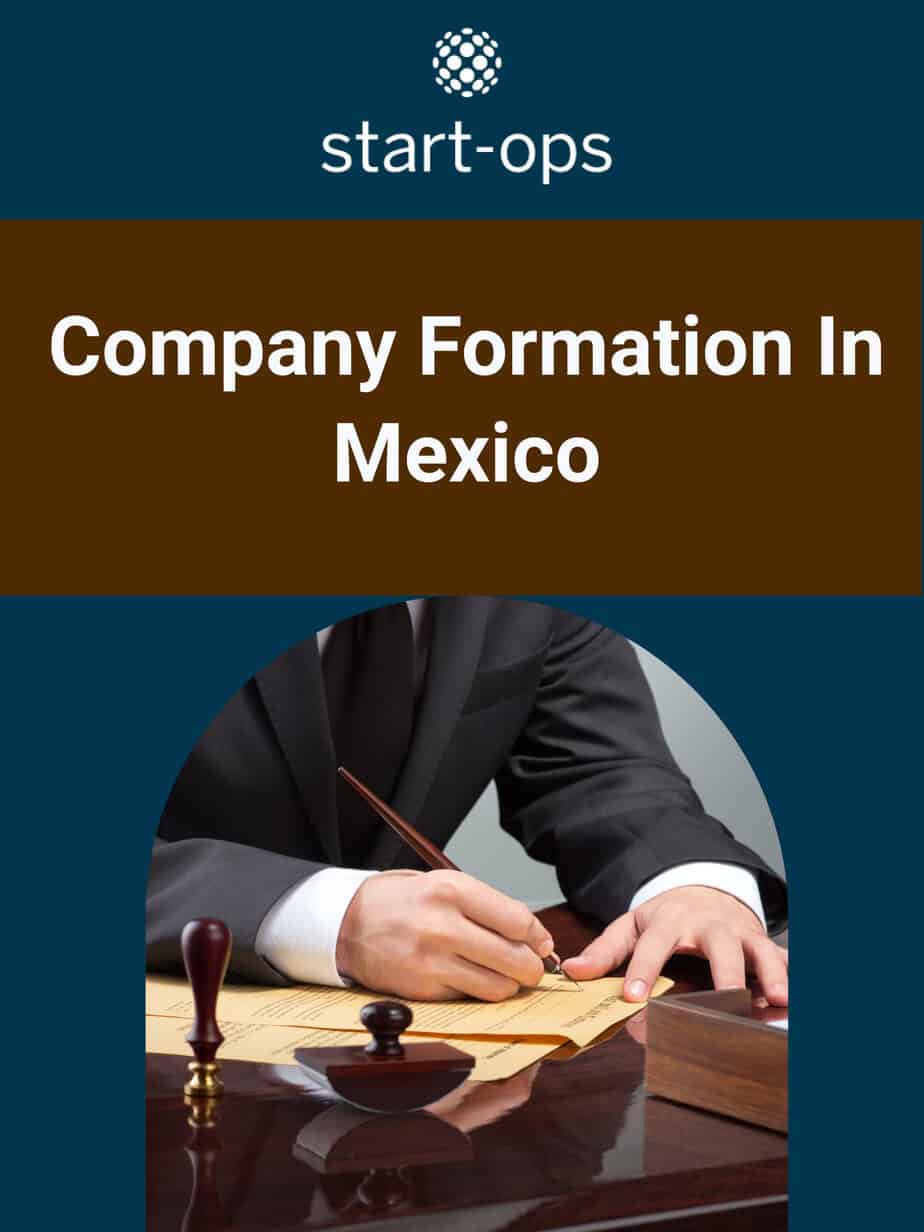Last updated on July 28th, 2023 at 01:49 pm
The Mexican LLC is called Sociedad de Responsabilidad Limitada de Capital Variable (S de RL de CV). This is one of the types of business entities in Mexico that you can incorporate if you wish to start a business in Mexico. The S de RL de CV is a nonnegotiable stock corporation. This means that owners cannot freely sell their ownership. Certainly, the Mexican LLC is the structure that best adapts to the needs of most foreigners looking to establish in Mexico.
Firstly, the owners have limited liability for their capital contributions, as the name implies. Therefore, the owners’ assets are fully separated from the company. So, they can’t be seized to pay the company’s obligations. Hence, they are not at risk. The losses of the company do not exceed the amount invested in it. Overall this is probably the biggest advantage of an LLC.
Secondly, it has a fast incorporation process. After all, the structure of the S de RL de CV is for smaller groups of members. Therefore it is more agile than other types of legal entities in Mexico. And thirdly, it has simplified corporate management. Furthermore, de Capital Variable (CV) means the company can increase or reduce its capital. So from now on will call it S de RL for simplicity.
When foreigners seek to open a business in Mexico, they have to decide on the type of entity they will incorporate in. This article should help you understand if the Mexican LLC is the correct type of company for your business. If you still have doubts regarding the best type of business entity you should incorporate in Mexico, contact us. Our team will be happy to help you make the right choice. To understand how companies pay taxes in Mexico, read our article Taxes In Mexico: A Guide For Foreigners.
General Information
It is important to note that S. de R.L. is not a partnership but a corporation. Hence the separation between the owners and the business. Also, the company has its rights and liabilities. In short, it is a separate entity. Indeed, the General Mercantile Corporations Law, or Ley General de Sociedades Mercantiles in Spanish, regulates every company in Mexico. Including the S. de R.L. Specifically, the fourth Chapter, On Sociedad de Responsabilidad Limitada, details the regulations, characteristics, and rules for this type of company. Therefore, what you read in this article is based on that law. As with all companies in Mexico, the S. de R.L. must be incorporated by a Public Notary in Mexico.
Sociedad de Responsabilidad Limitada Key Facts
- Owners are called partners.
- Partners have their liability limited to the amount invested in the company.
- No minimum capital requirements.
- Must have a minimum of two partners.
- It cannot have more than 50 partners.
- Capital is represented by social parts (not shares)
- Each partner has ONE social part. Although social parts may be of different value.
- Votes are correlated to the amounts invested
- A Sole Administrator or Board of Managers manages the company.
- No statutory auditor requirement.
Corporate Management in a Mexican LLC
Firstly, the partners of an S de RL are the highest authority in the company. They exercise this authority through the General Partners’ Assembly. Ultimately, the Assembly takes the decisions by majority vote. Each partner has some votes related to the amount invested. Certainly, the higher the investment, the more votes a partner has. Generally, every MXN 1,000 represents a vote, i.e., if your invested capital were $7,000, you would get seven votes. The Mexican LLC has no extraordinary assemblies. Therefore, all of the decisions are made in the General Assembly.
Secondly, the Sole Administrator or a Board of Managers directs the company. They are in charge of management and have the company’s legal representation. An important point to notice is that the Sole Administrator usually is the one who bears the company’s signature or “eFirma.” The tax authorities give this signature. The manager of the company uses this signature in many administrative acts.
Thirdly, if the company chooses, there may be a vigilance committee. However, this structure is designed for smaller groups of people. Therefore, this is not mandatory.
General Partners Assembly
Here are some of the matters to be discussed at the assembly.
- Discuss and accept the company’s Balance sheet.
- Distribute the company’s profit.
- Appoint or dismiss managers.
- Ask the partners for further contributions.
- Change the articles of incorporation.
- Dissolve the company.
Differences Between an SA and an S de RL
In case you missed it, we wrote an article on what a Sociedad Anonima, the equivalent of the Corp., is. There are plenty of types of business entities in Mexico. However, in 98% of the cases, foreigners incorporate in one of these two types. The other ones are only used for very specific cases. So, in order to help you decide, I will make a comparison of these two business entities. Both types of companies are pretty similar. Besides, the articles of incorporation are very flexible. Ultimately, a good lawyer could draft them in a way that fit your business needs regardless of the type you choose. However, legislators created each of them for a specific purpose. So, choosing the one that best resembles your type of operation is best. Here are some things you need to take into account.
Size Of The Group Of Owners
The Mexican LLC is for smaller groups of owners. Ultimately you can see this in the fact that it has a limit of 50 partners. Conversely, the SA or Corp. is for larger groups of owners. You can see this in the fact that it has unlimited members. The ultimate goal would be to have a public company. Although this should not necessarily influence your decision. Not every SA plans to go public. In conclusion, you should consider the number of owners the company will have. For example, you may plan to raise equity from different investors. In this case, it is easier to do with a Sociedad Anonima than a Sociedad de Responsabilidad Limitada. The SA has a structure for it.
However, this doesn’t mean you cannot add another partner to the S de RL and raise capital. It is possible. But if you plan to do it often and as a part of the business, the SA would be the best choice.
Corporate Management
Another thing you should consider is the type of management you will have. If, for example, you own 99% of your company and you will be the Sole Administrator, having a SA doesn’t make sense. This type of company has a mandatory statutory auditor. This means you would need to pay someone to oversee you as a director and report back to you as a shareholder. Indeed, if this is the case, the S de RL is the way to go.
On the other hand, you may hire a board of directors that you don’t know. Maybe they will be Mexicans that you hire through Linkedin. In this case, a Sociedad Anonima may be a good option. Although the S. de R.L. has an optional vigilance committee too. Ultimately, the thing you have to keep in mind is that the statutory auditor is mandatory in the SA. Also, neither the shareholders nor employees can fill this position. Therefore, if you don’t need it, it will be an extra cost that doesn’t make sense.
Size Of The Operation
You shouldn’t let the size of your operation influence your decision. The SA and the S. de R.L. (the Mexican LLC) can grow as big as your business needs. Many foreign companies, Walmart Mexico included, incorporate as an S. de R.L. The reason is that their foreign company probably owns 99% of the Mexican company. So a simplified structure is the best for them. There is no limit to the size of either of these business entities. So you should not take this into account.
SA vs. S de RL
|
Sociedad Anonima |
Sociedad de Responsabilidad Limitada |
|
|---|---|---|
|
Stock |
Negotiable |
Nonnegotiable |
|
Statutory Auditor |
Mandatory |
Optional |
|
Maximum Shareholders (partners) |
Unlimited |
50 |
|
Liability |
Limited |
Limited |
Conclusion
When you look to establish a business in Mexico, you must decide the type of business entity for your operations. The options are the Mexican LLC (S de RL) or the Mexican Corp. (SA). The SA has a more complex corporate management structure. It requires a statutory auditor. Additionally, the SA is for larger groups of people. Therefore can have an unlimited amount of owners.
Conversely, the S de RL is for smaller groups of people. It can have up to 50 owners. Therefore, its management is simplified. An auditor or vigilance committee is optional.
If you wish to understand how this type of company pays taxes, we recommend reading our taxes in Mexico article.
I hope you enjoy this article and find value in it. I understand that this is a complex subject. Therefore, if you have any questions, please leave them in the comments below.
And please share it with someone that may be interested!



Add your first comment to this post